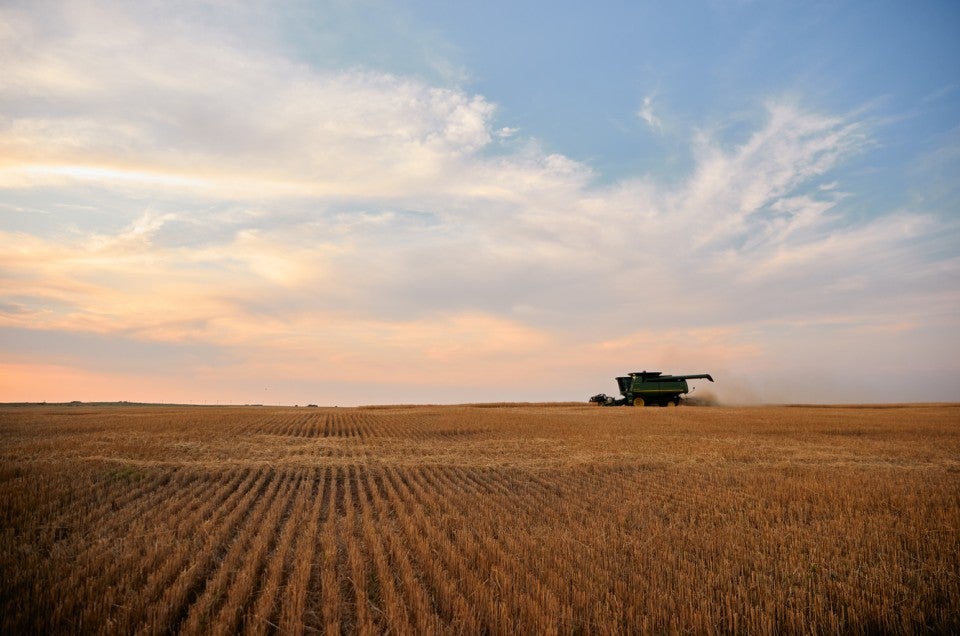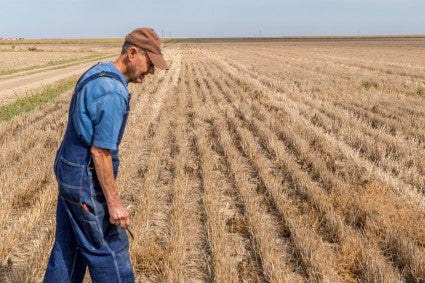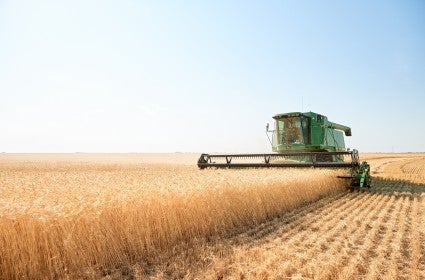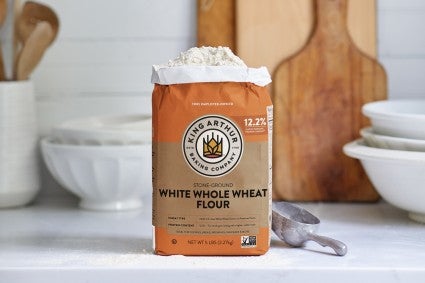What is regenerative agriculture, and why is it so important?
This critical approach to farming helps heal our land through flour.


As a baking company, King Arthur’s business depends on wheat. And wheat depends on farming.
As bakers (as well as a certified B Corp and triple-bottom-line business), that means we have a responsibility, both to the farmers we work with and the planet.
“We take our role and responsibility seriously in helping create a more resilient, equitable, and ecologically sound future — starting with wheat, where our decisions have the greatest impact,” says Suzanne McDowell, King Arthur’s Vice President of Corporate Social Responsibility and Sustainability.
Given that the heart of our business is flour, it only makes sense that we think critically as a company about wheat and how it can be grown, harvested, and milled in accordance with our values. That’s why by 2030, 100% of King Arthur flour will be sourced from regeneratively grown wheat.

Regenerative agriculture seeks to restore, renew, and enhance natural resources through a range of practices that focus on healthy soils, ecosystems, and farming communities. It’s not just about sustaining our planet, but actively healing it.
We consider regenerative agriculture a step up from sustainability — a way to shift agriculture from being part of the climate problem to being part of the solution. Examples of regenerative agriculture practices include cover cropping and crop rotations, minimizing inputs, no/limited tillage, and affordability and accessibility of crops.
It differs from organic agriculture in a few notable ways: Regenerative focuses on outcomes and principles, while organic is a labeling term that indicates products were produced by practices verified by the USDA — primarily without the use of synthetic pesticides and fertilizers.
This practice is also dedicated to improving the well-being of farmers and creating a future in which farming communities are economically viable and able to invest in practices that support the land. The goal is to create a system where farming is healthy for both the planet and for the people farming it. “It's sort of the ultimate version of sustainability,” says Dr. Stephen Jones, Director of Washington State University’s Breadlab, an organization committed to grain innovation and research with whom King Arthur has partnered since 2009.
While it’s especially critical for today’s planet, regenerative agriculture isn’t new — it embodies principles foundational to longstanding Indigenous land traditions, positioning humans as stewards of the land on which we live.

As King Arthur works toward our goal of sourcing 100% of our flour from regeneratively grown wheat, we recognize there’s a long road ahead. To achieve this benchmark, we’ll spend the next years learning from farmers and partners, acknowledging that we’ll need to adapt our strategies over time.
Because regenerative agriculture is as-yet unregulated and uncertified, we’re defining our own regenerative agriculture standards in collaboration with farmers and partners, working together to determine what changes truly makes sense for their land. Overall, our approach seeks these improvements:

We’re already incorporating regenerative agriculture into our work. All of our golden whole wheat flour is currently supplied by Farmer Direct, a collective that sources wheat from farmers committed to regenerative practices. “With the current rates of climate change, we have an ethical responsibility to produce wheat and flour as sustainably and nutritionally as we can,” says Farmer Direct chairman & CEO Tim Webster. “This not only benefits the earth, but also our growers’ livelihoods and the overall health of consumers.”
What’s more, King Arthur has enrolled in a 20,000+ acre regenerative pilot program with one of our milling partners, Ardent Mills in Kansas. We’ve also expanded our partnership with The Bread Lab to support their work breeding climate-resilient wheat that can withstand the chaotic effects of climate change, like fluctuating temperatures and water levels, that will eventually be the foundation for climate-friendly flour.
Moving forward, we’ll be partnering with farmers and millers to source from those already following regenerative practices and to convert additional acres where they’re not. We’ll participate in grower meetings to learn from producers and eventually develop new wheat sourcing guidelines; create a farmer engagement program that includes consistent regenerative wheat practices, outcome metrics, and traceability to source; and establish a council to guide us on best practices and hold us accountable on our regenerative endeavor. And in a decade, all of the wheat that is milled into flour sold under the King Arthur label will be regeneratively grown.
It will be hard work, to be sure. But we’re committed to embodying our values and taking initiative. Because ultimately, regenerative agriculture will benefit farmers, consumers, our planet, and, in turn, bakers everywhere.
To learn more about how to bake with the planet in mind, see our Sustainable Baking Guide.
Cover photo by Scott Slusher.


January 21, 2024 at 11:09am
In reply to How will this impact your… by Mary (not verified)
Hi Mary, we're happy to confirm that this Climate Blend Flour is considered one of our Signature Flours, and therefore meets the allergen standards of that category as before. Apart from wheat, no U.S. top 9 allergens are added to our Signature Flours. Our Signature Flours packaged in paper bags are produced in a facility where wheat is the only top 9 allergen in production. This product does not contain mustard plant, but we do not test for mustard in the final milled product.
January 25, 2024 at 6:00am
In reply to Hi Mary, we're happy to… by ttheriot
Nobody accused you of adding mustard to the flour. They asked if mustard plants were incidentally harvested along with the wheat so it is contaminated before it reaches the "facility" for milling. Do the farmers prevent mustard plants from being caught up with the wheat in the combine?
February 4, 2024 at 10:51am
In reply to Nobody accused you of adding… by KH (not verified)
Because mustard is not a US Top 9 allergen, the farmers and mills are not required to disclose if there is a possibility of cross contamination in the field or in the mill. I'm sorry to hear this isn't the answer that you're looking for. Because we do not test for the presence of mustard in the final product, we cannot guarantee against any cross contamination.
January 7, 2024 at 4:16pm
I use King Arthur flours. I enjoy this website. I am not clear, however, after reading various articles provided on this site about sustainable vs regenerative agriculture vs organic agriculture, how anything but organic farming practices which and avoid glyphosates can actually rebuild soil that contains and sustains earthworms. I wonder if regenerative agriculture is a way to stealthily, gradually, address changing entrenched practices and mindsets that are resistant to change.
I feel better the more organic products I use. I've had health issues that have healed with organic approaches. I used other non-mainstream approaches along with organic foods to reclaim my health and well-being. All are expensive and worth it. If a person can afford it.
I do applaud all efforts to move a profit-driven economy and civilization toward deeper understanding of what has happened to soil over the past decades--and to the understanding of why it's important to recognize what's going on or ISN'T going on. There is no living soil left in the farming communities I have grown up in. Living soil smells rich and is black and deep and has earthworms, all of which smell alive. Dry brown chemical soil smells dusty and dead. There's no organic heart to it. I doubt most younger people have had the advantage of smelling and seeing that kind of soil. Plus, the onward march of destruction of any wetlands surrounding communities where I live is further testament to blind, mind-dead land management practices that have no inkling of what a healthy ecosystem looks like, smells like and provides to the earth and her occupants.
Yes, there is some movement toward acknowledging damage has been done and the need for restoration. I'm for that. 100%.
But I'm also concerned that a green bag and certain words that make it sound like the problem is being managed can trick a somnolent populace into further complacency. They think, well, the right flour and an electric car and all is fixed that I have to concern myself with. End of their involvement. All the while, their health and the health of every living being on this suffering planet remains at risk.
Our health is our wealth. Not corporate bottom line profits. I care. I think you care. Please consider what I have said as you go forward. Keep it in your hearts. Take it to your conversations at the tables where you plan policy and procedure and practice. Thank you.
January 13, 2024 at 9:43am
In reply to I use King Arthur flours. I… by Abby Molino (not verified)
Hi Abby, thanks for your thoughtful feedback! We do care and I will pass along your comments for consideration.
January 5, 2024 at 9:35am
How can the use of glyphosphate that is federally legal to use on non organic flours helping the environment and climate change? Do your contracted farmers use this chemical in the regenerative flour? If so, it seems like double talk of a key selling point to get customers to buy in to an idea that the flour is somewhat healthier if it's regenerative.
January 21, 2024 at 11:15am
In reply to How can the use of… by Michelle McClin (not verified)
Hi Michelle, thanks for your curiosity regarding our new Climate Blend flour. At this time, this product is not certified Organic, so the federal regulations regarding use of desiccants and herbicides shared on posts below will apply. However, the Regenefied Certification requires farmers to reduce the number of chemical inputs they use, and completely prohibits the application of chemicals to the wheat within 21 days prior to harvest. It’s not organic, but we are making sure there is a significant reduction in herbicides used on these wheats. We're looking forward to many years of innovation when it comes to regenerative and certified Organic flour, and we're happy to hear you're along for this journey with us!
November 30, 2023 at 10:00am
Thank you for your efforts in addressing environmental concerns and supporting farmers. My question is, what role will biosolids play in your regenerative efforts to improve soil? Are biosolids currently being used on your farms?
December 3, 2023 at 1:15pm
In reply to Thank you for your efforts… by TW (not verified)
We do want to assure you that for all of our products, we start with our commitment to ensuring the highest quality possible. We partner with mills and farmers to produce flour that meets our high standards and specifications to ensure superior baking performance.
The EPA permits the use of biosolids with non-organic agriculture under certain conditions and which meet their criteria for application. They provide detailed information regarding when it can and cannot be used, here. Because biosolids are federally permitted under certain conditions, farmers retain the option of using this resource as long as they follow all rules and regulations that apply. We’re simply unable to guarantee its use or non-use with non-organic wheat in a given situation.
We also offer a full line of certified 100% organic flours, where the use of biosolids is prohibited. We offer our organic line to ensure that our customers have options to suit their individual needs. Our organic flour line is independently verified by QAI (Quality Assurance International) to ensure organic certification requirements are strictly followed.
November 11, 2023 at 11:08pm
Bravo for King Arthur! Your quality and employee ownership already had me aboard. Defining and pursuing “restorative agriculture” promises even more. As regards growing wheat and other row crops, farmers generally have two choices for weed control; plowing or no till. The former promotes erosion and destroys soil structure. The latter requires an herbicide, typically Round Up. Nature Conservancy uses it as needed on Reserves, Environmental Defense Fund has been advocating for no-till in Delaware farmland to reduce runoff going to Chesapeake Bay. Also, last I checked, there is no GMO wheat, but I’d be happy to be updated.
Pagination